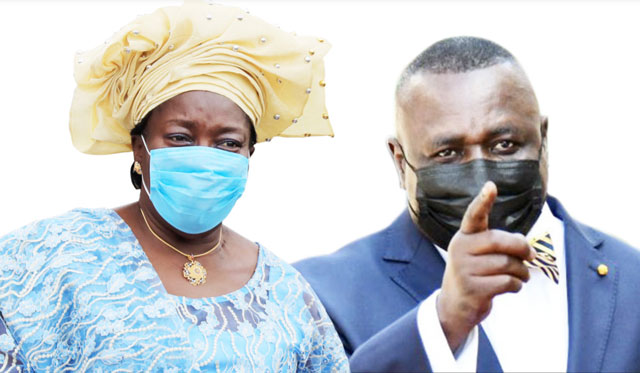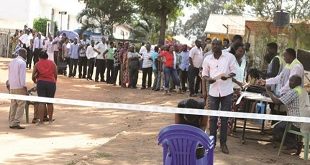
When Rebecca Kadaga fell on May 24, Museveni appended parliament to his courtyard in a grim proposition
COMMENT | RAJAB KAKYAMA | Refer to: “NRM leaders pick Oulanyah” (the Independent online May 23). As Ugandans warm up for President Yoweri Museveni’s sixth term, the cynosure is at parliament tomorrow. Uganda unlike many commonwealth countries where the speaker is dragged into the seat, here the contestants bribe their way into the seat. The NRM political ideology is synonymous with money- it is the glue that holds that party together. I have previously noted the simmering bad blood between the president and the person of the speaker. Museveni, like any authoritarian, likes domination. And in the game of domination, no star illuminates without the sun. Museveni believes and acts like the sun. In the past he’s taken away this shine from Samson Kisekka, Paul Kawanga Ssemogerere, Specioza Kazibwe, Gilbert Bukenya, Amama Mbabazi and now the jostle is around Rebecca Kadaga. Will she survive Museveni’s onslaught? Will Museveni prevail? Will the NRM survive?
The NRM political party faces three ailments: (1) Liminality, (2) Revisionism and (3) Substitutionism
Liminality is an anthropological term meaning disorientation or departure from the norm. When the NRA/NRM emerged from the bushes of Luwero, they had a Ten Point program and they also professed to a three year transitional government.
One of the points on the Ten Point program was social and economic transformation. But after 35 years of NRM what is clearly in sight of Ugandans is that President Yoweri Museveni and a few ruling elites have evolved but Uganda as a society has not revolutionised.
Since the early 90s the country has been at “take-off” stage. We were then promised to be a middle income state by 2020. However, in 2021, our GDP per capita is still below $1,000. The irony is that the NRM sees itself as the only party capable of achieving this milestone and opposing it is next to sacrilege. I, therefore, take it that the leadership of the NRM is as delusional as the people. What the NRM leadership has decided to do is to doll out political gifts for political settlements. Handing the speakership to Jacob Oulanyah is a “thank you” gift for the Acholi people for having voted “wisely!” But the same was done for Luwero which was handed a ministerial post and there is still no development in that part of the country.
The NRM has been deploying the colonial tact of divide and rule. At its inception, there was the South (good) and North (bad). It seems the lie has come full circle and they’re now revising that position. The problem with handing Jacob Oulanyah the speakership is that it undercuts his effectiveness in office once he’s faced with the dilemma of impartiality. For instance, what will be expected of Oulanyah if the bill for term limits is reintroduced? How “independent” will he be once the party caucus has pronounced itself on a given matter? But most importantly, by him relying heavily on the powers of the President, he rents out his political career to the person of the president.
So, three people were standing public trial during the election of Speaker on May 24. There was Jacob Oulanyah, the MPs who voted for him, and President Museveni. Rebecca Kadaga is largely a victim of the politics gone wrong and she carried the sympathy vote of every mistreated Ugandan.
(2). Revisionism: Over the years, the Ugandan constitution has gone through fundamental changes. Once acceptable positions have since been overturned. Similarly, the NRM party has taken on board some fundamental changes. We no longer have age limit and no term limits. In the NRM political party some positions have been ring-fenced for particular people. This suffocates political space making the few available political positions highly competitive. Rebecca Kadaga and Jacob Oolanya should be viewed largely as victims to the longevity of the Museveni rule. If there are certain positions that are a no-go area, then, where did you expect Kadaga to go? I heard it from Ofwono Opondo who is government spokesman saying that if Museveni cannot leave power, at least let us have some democracy down below! Such oxymoronic thinking should be dispelled with the contempt it so deserves. There has always been a truism that what’s good for the goose is for the gander.
(3) And lastly, substitutionism: In Lenin’s Russia, he had foretold of a revolution that never materialised. In 1902, he together with his Marxist friends, had formed the Russian socialist labour party. It later split due to his uncompromising rigidity and the two factions of Bolsheviks and Mensheviks. One of his ardent followers that turned critic, Trotsky had this to say about the authoritarian nature of Lenin. “Where the proletariat was substituted for the party organisation, the party organisation was substituted for the party central committee and the party central committee was finally substituted for the leader of the central committee.”
This description of power control (absolutism) is alive both in the three arms of government of Uganda and within the ruling NRM party. President Museveni appoints the whole executive with the approval of parliament. He also appoints all the judges with the approval of the judicial service commission. The only arm of government that Museveni has not been appointing is that of the legislature. When Rebecca Kadaga fell on May 24, Museveni appended parliament to his courtyard and that proposition is grim. Inside the NRM Museveni rides high. He has reserved a place for his national vice chairman and he appoints the NRM secretariat including the secretary general. In the army he appoints the whole rank and file.
At the moment Museveni looks untouchable but soon he will realise that his hands are rather too short to fight with God. I genuinely feel that the only realistic hope we have as a country is prayer. And although I harbour no hatred for Jacob Oulanyah my fingers are crossed for Kadaga.
****
 The Independent Uganda: You get the Truth we Pay the Price
The Independent Uganda: You get the Truth we Pay the Price



‘I genuinely feel that the only realistic hope we have as a country is prayer.’ Having started with an intellectual disection of the matter, you conclude with a hopeless resignation to superstition.
Perhaps the solution is difficult to articulate without enlisting the supernatural! Maybe all that is left to do is look to the heavens for unlikely divine intervention! Even consummate intellectuals are sometimes seduced by hope in opposition to fact. It shows how desperate some situations, like the one Uganda is in, truly are.